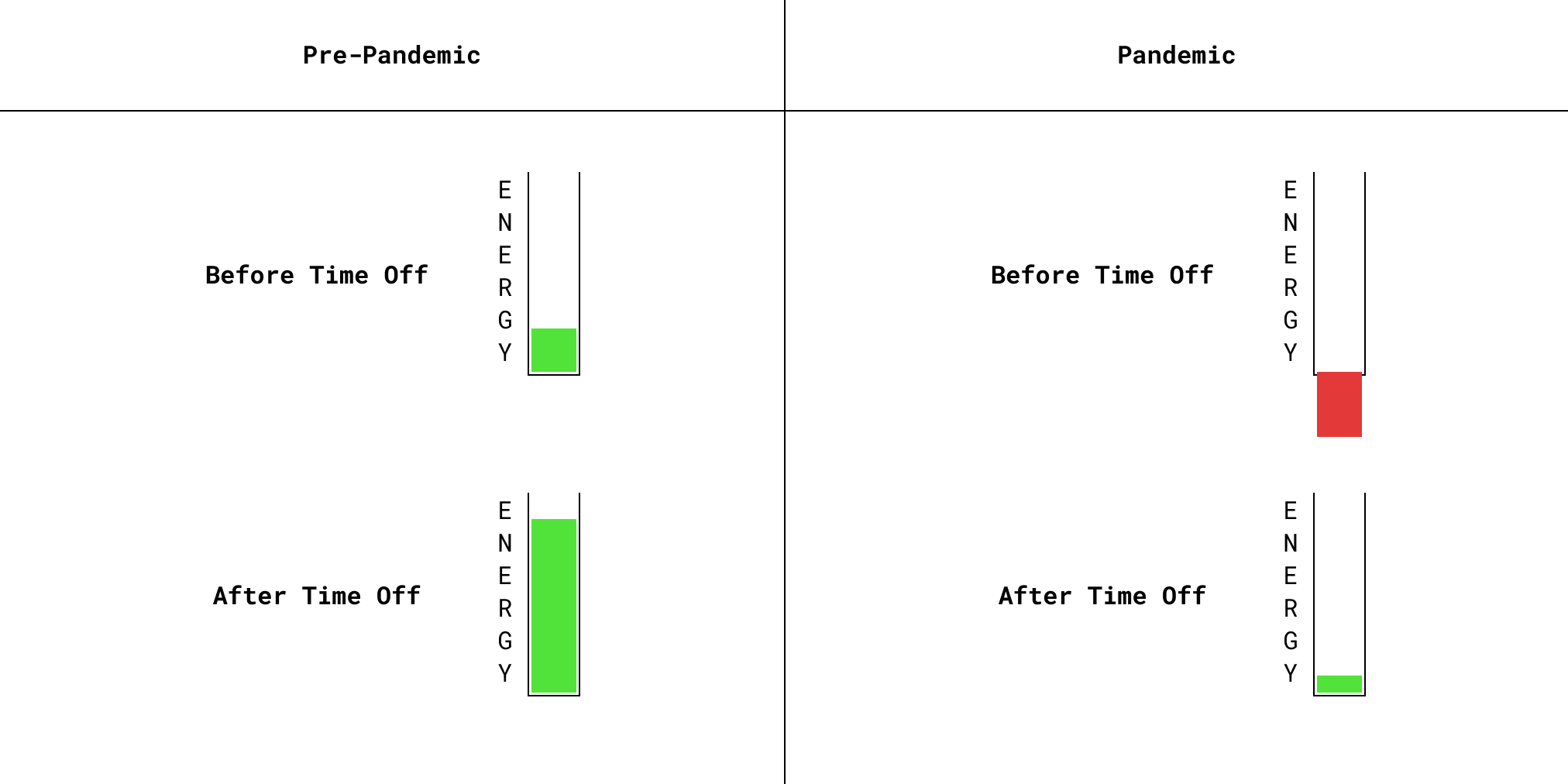Time Off Isn't a Bandage, It's a Veggie
I wanted to try something different this year. I looked back at my career and realized I had continually, at least twice a year, suffered from major burnout. I would work work work and then come skidding and crashing into an abyss of despair with nothing left in the fuel tank to get me back out.
This cycle would usually end up with me asking to take time off, scraping my brain off the ground and slowly recombobulating myself over the coming weeks, often taking a very long time to get back to maximum capacity.
For the longest time, I just accepted this as a normal reality — this is just how the world worked and I had to live with it.
Then the pandemic hit. Work was different. My worries were different. Burnout was different. I couldn't quite recover as fast. Burnout became something I was constantly staving off every day, not just a couple of times a year.
I even made a little graph I tweeted out to convey how pandemic time off just hit different.

I needed help to think through this and as I started to work through things in my life with the help of a therapist, I started thinking about how I could better reframe my relationship with work.
I come from a family of very hard workers in middle america. It was pressed onto me from a very young age how important the value of hard work is and that at the end of the day (outside of religious beliefs) hard work was the ultimate way to determine the value of your existence as a human being.
This manifested in how I showed up to work every day and was often rewarded, but was mostly taken advantage of. I felt guilty every time I took time off and when I wasn't thinking about work or progressing my career in some way.
This guilt led me to work longer hours and take less time off — something that likely was seen as great for business, but it was slowly eating me away. By the time it caught up with me during the pandemic, I knew I had to change my mindset.
Enter 2022. This year I made a pact with myself to reframe the way I thought about my relationship to work. One of the main ways I did that was reconsidering the time I spent working or not working and thinking about time off less as a curative healthcare in response to burnout and more preventive healthcare to help me not end up burnt out to begin with.
In doing that I planned for specific times to take off in advance that I could look forward to through the year and on a schedule that seemed to line up with when I would often start to get burnt out in the past, being more realistic about the status of my energy levels.
On a more day-to-day level I also did things like set up blocks for time at the end of the day to finish remaining tasks and set up a lamp at my desk to turn off precisely at a specific time so I would have a better sense of when to stop working and plan out my days more accordingly if I end up working past that time.
All of this points to the main idea of using time to your advantage. Being proactive about understanding yourself and your relationship to work and using time not working as a tool to help give you the right energy you need to sustain yourself.
I happen to be fortunate to work for a company that has a decent time off policy and I recognize not everyone has that luxury. In general I'm of the mind that all American companies could offer much much more time off and we'd still be as, if not more productive. However, that's sadly not my decision to make.
What's important is understanding what is in your control by analyzing your relationship to work and how work impacts your life. Then setting realistic expectations for yourself by providing some level of structure that doesn't pretend that burnout doesn't exist and instead prepares against it.
This mental shift has led me to work overall less but smarter and more sustainably and I think with all things said and done has made me more productive because my energy levels are more constant and predictable.
There's more than one way to work and be productive. The myth of "hard work over all" that leads people to sleep in offices, miss making memories with their family, and even lose their personal identity is a myth we need to kill with a vengeance. Continual burnout doesn't have to be something we just live with.
This lesson is important for your own relationship to work, but if you're a leader you also have to opportunity to set the standard for how people relate to work on your team and be smart and thoughtful about it instead creating an environment that allows burnout to flourish.
Plan ahead, take care, and don't forget to eat your vegetables.